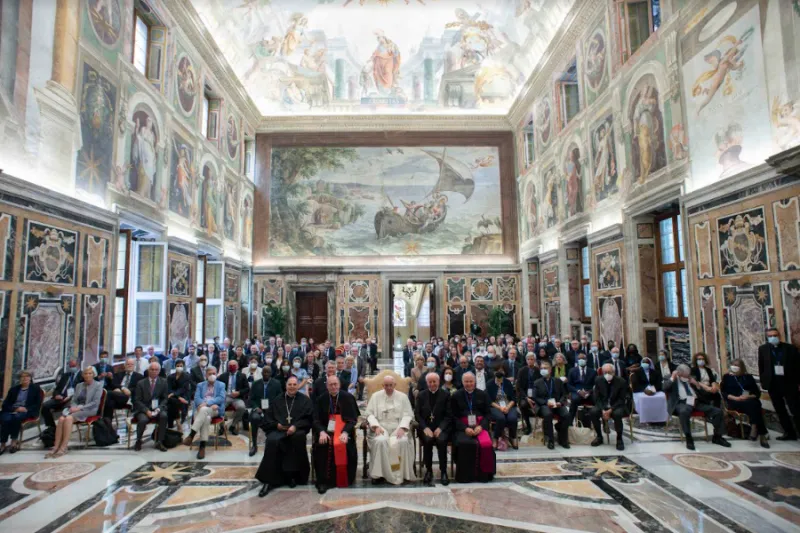
Vatican City, Jun 24, 2022 / 12:54 pm (CNA).
The Pontifical Academy of Life said Friday that the U.S. Supreme Court’s decision to overturn Roe v. Wade “challenges the whole world.”
“The court’s opinion shows how the issue of abortion continues to arouse heated debate. The fact that a large country with a long democratic tradition has changed its position on this issue also challenges the whole world,” the Vatican academy wrote in a statement on June 24.
“The protection and defense of human life is not an issue that can remain confined to the exercise of individual rights, but instead is a matter of broad social significance. After 50 years, it is important to reopen a non-ideological debate on the place that the protection of life has in a civil society to ask ourselves what kind of coexistence and society we want to build,” it said.
The academy’s statement was the first official reaction to the court’s decision issued by an entity linked to the Roman Curia. Pope Francis has condemned abortion using strong language, referring to it as “murder” and on multiple occasions comparing the act of killing an unborn child to hiring a “hitman” to solve a problem.
Archbishop Vincenzo Paglia, the president of the academy, said: “In the face of Western society that is losing its passion for life, this act is a powerful invitation to reflect together on the serious and urgent issue of human generativity and the conditions that make it possible.”
Regarding the United States Supreme Court decision that modified the 1973 legal position Roe v. Wade on the issue of abortion, the Pontifical Academy for Life presents the following statement. pic.twitter.com/VJW6sCE053
— Pontifical Academy Life (@PontAcadLife) June 24, 2022
The Pontifical Academy of Life also urged the importance of assisting mothers carry on with a difficult pregnancy, as well as “ensuring adequate sexual education, guaranteeing health care accessible to all and preparing legislative measures to protect the family and motherhood.”
St. John Paul II founded the Pontifical Academy of Life in 1994 to have the specific task of studying and providing formation on issues in biomedicine and the law regarding the promotion and defense of life.
Venerable Jérôme Lejeune, the French geneticist who discovered the extra chromosome that causes Down syndrome, served as the pontifical academy’s first president.
The Pontifical Academy of Life wrote that it joined the U.S. bishops in calling for “healing wounds and repairing social divisions.”
“It is a time for reasoned reflection and civil dialogue, and for coming together to build a society and economy that supports marriages and families, and where every woman has the support and resources she needs to bring her child into this world in love,” the academy said.
If you value the news and views Catholic World Report provides, please consider donating to support our efforts. Your contribution will help us continue to make CWR available to all readers worldwide for free, without a subscription. Thank you for your generosity!
Click here for more information on donating to CWR. Click here to sign up for our newsletter.




A rather muted and technical response…almost apologetic.
Not surprised that Paglia, who painted a blasphemous pornogrsphic mural in his cathedral, seems less than enthusiastic about this monumental court decision.
A welcome response from the Pontifical Academy for Life, couched in diplomatic somewhat open ended terms [in agreement with Ramjet]. However, at least it’s positive in suggesting a worldwide reevaluation of universal promotion of abortion.
The Academy must now be proactive to be both effective and convincing. An important opportunity that deserves positive Church engagement in favor of life.
Additionally, “The Academy said it is a question of developing political choices that promote conditions of existence in favor of life without falling into a priori ideological positions” (E Pentin in NCReg). Pentin then apparently picking up on the Vatican-Francis codeword “ideological” requested further comment, “The Register has asked the Holy See Press Office and American Cardinal Kevin Farrell, prefect of the Dicastery for Laity, Family and Life for comment, but they have not yet responded” (Ibid).
When doctrinal orthodoxy is thought ideological it requires a bit of time to finagle an inveigled response.
Referring to ideologies, the key sentence in Paglia’s letter reads: “After 50 years it is important to reopen a non-ideological debate on the place that the protection of life has in civil society to ask ourselves what kind of coexistence and society we want to build.”
A close look finds this sentence to be both edifying, in that it transcends ideologies, and problematic in that it doesn’t…
Does the wording imply that defenders of human life, too, have been witnessing on an ideological level now to be set aside?
Does the wording imply a further bifurcation between human society and strategic retreat to a modernist and “civil” variant detached from morality?
Does the wording imply a too-much globalized world with a middling and ambulatory kind of “coexistence”—viz, a presumed fraternity subject to the potentially too-pragmatic “principles” of Evangelii Gaudium, that: “realities are more important than ideas,” “time is greater than space,” “unity prevails over conflict,” and “the whole is greater than the part”? (The receding goal posts of a “moveable feast”)?
And does the premise that society is something that we “build,” and not—first—something that we “discover” as already given, permanent and universal; as already existing within ourselves as the baked-in natural law which to be preserved (not violated)?
The letter is necessarily short, but what might we find written between the lines? Like Paglia’s infamous and homoerotic cathedral mural, is the handwriting on the wall?